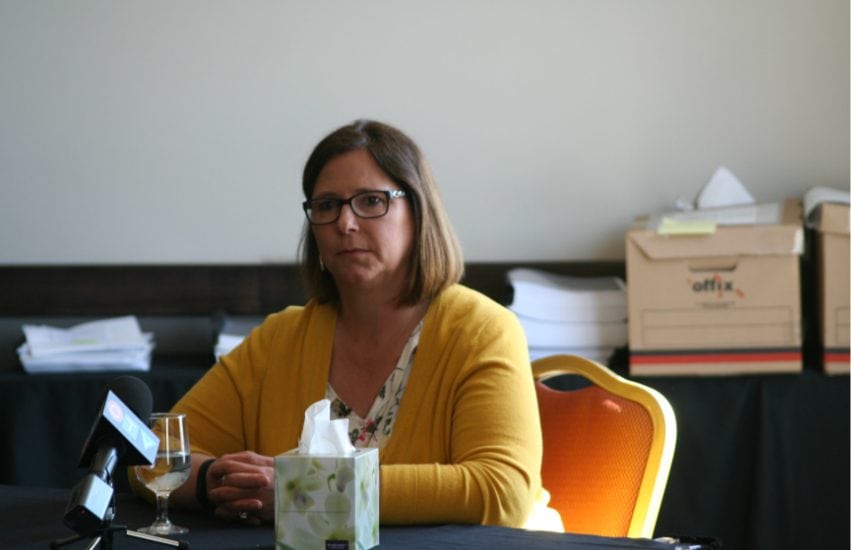KJIPUKTUK (Halifax) – Yesterday’s human rights inquiry into the lack of supportive housing for people with disabilities provided both heart wrenching personal accounts of the harm of institutionalization, as well as insight into the politics of wait lists and policy decisions.
In the morning we heard from two mothers who saw their children suffer while they languished in a large institution, and subsequently flourish when after many years they were finally transferred to a small option home.

The first witness, Brenda Hardiman, is the mother of Nichelle Ben, the young woman who in 2013 was fingerprinted and charged with assault for throwing a foam toy at a Quest staff person. There were rallies at the institution in Nichelle’s support, and the court case, reminiscent of what happened to Ashley Smith, generated quite a bit of interest at the time.
Throughout the ordeal Hardiman fearlessly spoke up for her daughter, and subsequently became a spokesperson for other parents facing similar predicaments.
Hardiman described how Nichelle, who lives with developmental disabilities and cerebral palsy, lived for ten years with Troy and Theresa Robinson, who acted as a so-called alternative family. Nichelle experiences bouts of aggression, but her temper tantrums were successfully managed during that period.
Trouble started when the Robinsons proposed an alternative arrangement to Community Services, asking that Nichelle, now 25, continue to stay with the Robinsons during the day, but spend the night in a small option home.
Community Services said no, explaining that there was a moratorium on the creation of new small option homes.
Nichelle was placed at Quest, and Hardiman had little choice in the matter, she told the enquiry. Hardiman remembers her first visit. “I will never forget,” she said. “In the hallway was a man without any clothes, dragging himself over the floor. Where is the dignity for that poor man?”
“It was a horrible place. I used to make unannounced visits, and residents would just sit there. Nichelle would call me, begging to get out,” Hardiman said.
Hardiman credits a meeting with the premier, accompanied by Dalhousie Law professor Archie Kaiser, with Nichelle’s move to her current small option home in Dartmouth.
If this is true than it once again suggests that wait lists aren’t quite the orderly queue suggested by that name. It appears that the only way to move to the top of the list is some kind of crisis, be it parents becoming unable to care for their loved ones, or, as in Nichelle’s case, political pressures becoming too intense. The wait lists is managed by Community Services alone, and logic around prioritization is closely guarded by the department.
After a close to three year stay at Quest, Nichelle now has her own key to her own home. She can make a sandwich whenever she wants. It’s a regular home instead of an institution, Hardiman said. “She’s been there now for over three years. She’s still Nichelle, she still has tantrums, but she is much improved.”
“Quest is a warehouse. I stand by that.”
Leslie Lowther had a similar story to tell. Her son Richard suffered a brain injury after an ATV accident when he was a young adult. After a four-months coma. He has difficulty walking, his hands shake, his short term memory isn’t strong, and he too experiences bouts of aggression, Lowther explained.

When it proved too difficult to look after Richard at home, Community Services suggested that he, like Nichelle, move to Quest.
“I would get phone calls, mum, get me out of here,” Lowther said. “One resident would scream non-stop, and Richard is physically unable to tune it out. It all comes right at him.”
There were no residents that Richard clicked with, and staff often would not have time for him. There were no programs for him, and Richard fell into a deep depression, Lowther said. “Quest is a warehouse. I stand by that,” she added.
To deal with his aggressive bouts they would take family time away, Lowther told the enquiry. He would not be allowed to go home for the weekend. On one occasion he was not allowed to come home for Christmas.
Finally, after nine years of sheer hell, Richard is now at a small option home in Windsor that he shares with one room mate. And he is doing great!
“He preps his own meal, they all sit down for meals, and he volunteers at the food bank twice a week. His sense of humour has returned, people love him,” Lowther said. “People at the small options home treat him like a 32-year old. We don’t see the same aggression. Richard still gets upset, but staff don’t dwell on it. It’s over and it’s done, as opposed to the Quest approach.”
Roadmap to nowhere
The remainder of the day was taken up by Wendy Lill’s testimony. Lill’s son lives with Downs syndrome, but questions quickly shifted to matters of policy. Lill has long advocated for better housing supports for people with disabilities through her involvement with the Community Homes Action Group.
Of particular interest was Lill’s involvement, as co-chair, with the creation of what is commonly referred to as the Disabilities Roadmap. That policy document, initiated and endorsed while the NDP was in power, laid out a high-level plan that would see larger institutions closed and community-based living options greatly enhanced.
The original document proposed a five-year timeline, but that was changed to ten years by the NDP government, to deal with concerns about closing institutions, jobs, etc., Lill said. We also understood some parents needed to be won over.
Nonetheless, at the time there was a real desire to make the roadmap succeed, Lill said.
After the NDP lost the election things changed.
Although Joanne Bernard, the newly elected Liberal minister of Community Services, committed to continuing the directions set by the document, that never materialized on the ground.
Lill continued to sit on an advisory committee. “We wanted minutes, many concerns we raised never made it to paper. Three years in we were concerned that capacity had not increased, that wait lists continued to grow. We raised these concerns at every meeting. There were enormous amounts of power points and mountains of paper, but on the ground it did not compute.”
If you can, please support the Nova Scotia Advocate so that it can continue to cover issues such as poverty, racism, exclusion, workers’ rights and the environment in Nova Scotia. A paywall is not an option for us, since it would exclude many readers who don’t have any disposable income at all. We rely entirely on the kindness of occasional one-time donors and a small group of loyal monthly sustainers.



